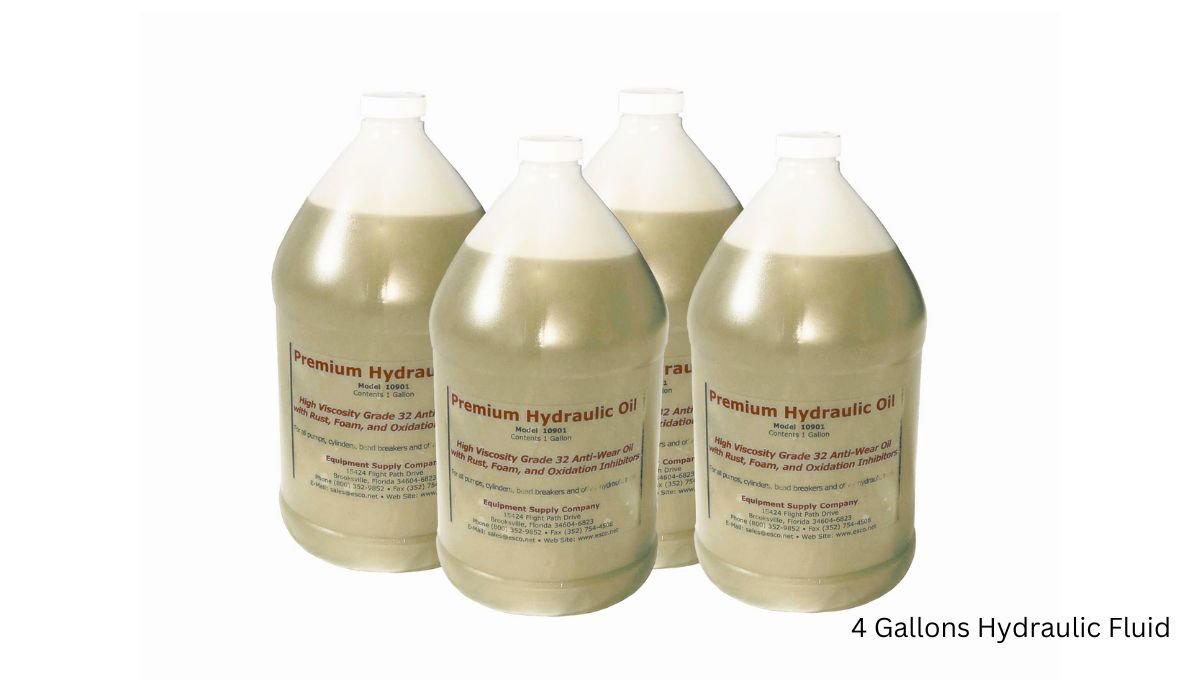How Much Does a Gallon of Hydraulic Fluid Weigh? Unveiled!
A gallon of hydraulic fluid weigh approximately 7.2 to 7.8 pounds. The exact weight varies based on the fluid type.
Hydraulic fluid is essential for various industrial and mechanical systems. It helps in transmitting power and lubricating components. Different types of hydraulic fluids have unique properties tailored for specific applications. They include mineral-based, synthetic, and water-based fluids. Proper maintenance and regular checks ensure optimal performance.
Choosing the right hydraulic fluid impacts the efficiency and longevity of machinery. Understanding the weight and type of hydraulic fluid helps in inventory management and operational planning. Accurate knowledge about hydraulic fluid is crucial for system efficiency and safety.
Introduction To Hydraulic Fluid
Hydraulic fluid is essential for many mechanical systems. It transfers power within hydraulic machinery. Understanding hydraulic fluid is crucial for maintaining equipment.

What Is Hydraulic Fluid?
Hydraulic fluid is a liquid used in hydraulic systems. It transmits force and controls movement. The fluid operates under high pressure. It also lubricates and cools system parts. Common types include mineral oil, synthetic oil, and water-based fluids.
Roles And Applications
Hydraulic fluid serves multiple roles in machinery:
- Power Transmission: It transmits power in hydraulic pumps and motors.
- Lubrication: It reduces friction and wear on components.
- Heat Transfer: It dissipates heat generated within the system.
- Contamination Removal: It carries away contaminants and debris.
Applications of hydraulic fluid include:
- Construction Equipment: Excavators and loaders use hydraulic systems.
- Aviation: Aircraft use hydraulic systems for control surfaces.
- Automotive: Power steering and brake systems rely on hydraulic fluid.
- Industrial Machinery: Presses and injection molding machines use hydraulics.
Understanding these roles helps in choosing the right hydraulic fluid. Proper selection ensures system efficiency and longevity.
The Weight Factor
Understanding the weight of a gallon of hydraulic fluid is crucial. This knowledge is vital for various industrial and mechanical applications. It ensures machinery operates smoothly and safely. Let’s dive into why this is important.
Importance Of Knowing Fluid Weight
Knowing the weight of hydraulic fluid helps in system design and maintenance. It ensures the machinery’s efficiency and safety. Correct fluid weight prevents wear and tear on components. It also aids in accurate measurement and fluid management.
- Ensures machinery efficiency
- Prevents wear and tear
- Aids in accurate measurement
- Facilitates fluid management
Factors Affecting Hydraulic Fluid Weight
Several factors influence the weight of hydraulic fluid. These factors include the type of fluid, temperature, and specific gravity. Each of these elements plays a crucial role.
| Factor | Description |
|---|---|
| Type of Fluid | Different fluids have different densities. |
| Temperature | Higher temperatures can reduce fluid density. |
| Specific Gravity | This is the fluid’s density compared to water. |
Understanding these factors is essential. It helps in choosing the right hydraulic fluid for your needs. This ensures optimal performance and longevity of your machinery.
Typical Weights Of Hydraulic Fluids
Hydraulic fluids are essential for many machines. Knowing their weight helps in planning and usage. The weight of hydraulic fluid varies by type.
Average Weights
The average weight of a gallon of hydraulic fluid is 7.2 to 7.8 pounds. This range depends on the specific type and brand.
Comparing Different Fluid Types
Different hydraulic fluids have different weights. Here’s a comparison:
| Fluid Type | Weight per Gallon (lbs) |
|---|---|
| Mineral Oil-Based | 7.2 |
| Synthetic | 7.5 |
| Water-Based | 7.8 |
Mineral oil-based fluids are common. They weigh around 7.2 pounds per gallon. Synthetic fluids are slightly heavier at 7.5 pounds per gallon. Water-based fluids are the heaviest, weighing 7.8 pounds per gallon.
Calculating The Weight
Understanding a gallon of hydraulic fluid weigh is essential for various applications. This section will guide you on how to calculate the weight of a gallon of hydraulic fluid. Knowing the weight helps in transportation, storage, and usage planning.

Volume-to-weight Conversion
To calculate the weight, you first need to know the volume-to-weight conversion. Hydraulic fluid has a density that helps in this conversion. Typically, hydraulic fluid has a density of around 0.8 to 0.9 grams per cubic centimeter (g/cm³).
One gallon of hydraulic fluid is equal to 3.78541 liters. Since 1 liter of water weighs about 1 kilogram, hydraulic fluid, being less dense, will weigh slightly less. The formula to convert volume to weight is:
Weight = Volume × Density
Tools And Formulas
To make the calculation easier, you can use various tools and formulas. Below is a simple table to help you understand the conversion:
| Volume (gallons) | Density (g/cm³) | Weight (pounds) |
|---|---|---|
| 1 | 0.85 | 7.09 |
| 2 | 0.85 | 14.18 |
| 5 | 0.85 | 35.45 |
Using the table above, you can easily convert gallons to pounds. For more accurate results, you may use online calculators or mobile apps.
In summary, knowing how much a gallon of hydraulic fluid weighs is crucial. It helps in making informed decisions for storage and transportation.
Variables Impacting Fluid Weight
Different variables impact its weight. Here, we explore those key variables.
Temperature’s Effect
The temperature of hydraulic fluid significantly impacts its weight. As temperature rises, the fluid expands. This expansion decreases its density. Lower density means less weight per gallon. Conversely, cooling the fluid increases its density. Higher density means more weight per gallon. Always consider fluid temperature when measuring its weight.
Additives And Their Influence
Additives play a crucial role in the weight of hydraulic fluid. Various additives can be mixed into the fluid. These include anti-wear agents, rust inhibitors, and viscosity enhancers. Each additive has a different density. Adding them alters the overall weight of the fluid. For example, some additives are denser than the base fluid. This increases the total weight per gallon. Others may be lighter, reducing the overall weight. Knowing the types and amounts of additives helps in accurate weight calculation.
Industry Standards And Specifications
Understanding the industry standards and specifications for hydraulic fluid is crucial. This knowledge ensures you use the right fluid for your machinery. Hydraulic fluids are categorized by various standards. These standards help in determining the fluid’s properties and suitability for specific applications.
Iso Viscosity Grades
The ISO viscosity grades are essential for hydraulic fluid classification. ISO stands for International Organization for Standardization. They provide a standardized system for measuring fluid viscosity.
ISO grades are represented in centistokes (cSt) at 40°C. Here’s a table with some common ISO grades:
| ISO Grade | Viscosity (cSt at 40°C) |
|---|---|
| ISO VG 22 | 19.8 – 24.2 |
| ISO VG 32 | 28.8 – 35.2 |
| ISO VG 46 | 41.4 – 50.6 |
| ISO VG 68 | 61.2 – 74.8 |
Choosing the correct ISO grade is vital. It impacts the fluid’s performance and efficiency.
Api Classifications
The American Petroleum Institute (API) classifications also play a significant role. These classifications help in identifying the quality and performance standards of hydraulic fluids.
API classifications consider various factors, including:
- Wear protection
- Oxidation stability
- Corrosion protection
API standards ensure that the hydraulic fluid meets specific requirements. These requirements are necessary for the fluid to perform effectively in various conditions.
Both ISO viscosity grades and API classifications are crucial. They help in selecting the right hydraulic fluid for different applications. This ensures the longevity and efficiency of your machinery.
Practical Considerations
Knowing how much a gallon of hydraulic fluid weigh impacts transportation, handling, and storage methods. Here we explore these practical considerations.

Transportation And Handling
Hydraulic fluid typically weighs around 7.2 to 7.5 pounds per gallon. Knowing this helps in planning transportation and handling logistics.
| Volume (Gallons) | Weight (Pounds) |
|---|---|
| 1 | 7.2 – 7.5 |
| 5 | 36 – 37.5 |
| 10 | 72 – 75 |
For safety, use proper lifting techniques. Hydraulic fluid can be heavy in large quantities.
- Use pallet jacks or forklifts for large containers.
- Ensure secure packaging to prevent spills.
- Label containers clearly with weight information.
Storage Guidelines
Storing hydraulic fluid correctly is essential. It ensures quality and safety.
- Store in a cool and dry place.
- Keep away from direct sunlight.
- Use properly sealed containers to avoid contamination.
- Label containers with date of storage and weight.
- Follow OSHA guidelines for hazardous materials.
Proper storage extends the fluid’s lifespan and maintains its effectiveness.
Safety And Environmental Concerns
Understanding how much does a gallon of hydraulic fluid weigh is crucial. But knowing the safety and environmental aspects is equally important. Hydraulic fluid can be hazardous if mishandled. Being aware of the precautions ensures the safety of both users and the environment.
Handling Precautions
When dealing with hydraulic fluid, always wear protective gear. This includes gloves and safety goggles. Spills can cause slips and falls. Clean up any spills immediately. Use absorbent materials to soak up the fluid.
Store hydraulic fluid in a cool, dry place. Keep it away from open flames and heat sources. Ensure containers are sealed tightly. This prevents contamination and evaporation.
Disposal And Recycling
Improper disposal of hydraulic fluid is harmful to the environment. Follow local regulations for disposal. Many areas have specific guidelines for hazardous waste.
Consider recycling used hydraulic fluid. Many recycling centers accept hydraulic fluids. This helps reduce environmental impact. Recycled fluid can often be reconditioned for reuse.
To summarize the disposal guidelines:
- Check local regulations for hazardous waste disposal.
- Use designated disposal facilities.
- Recycle when possible.
By following these steps, you help protect the environment. Proper handling and disposal of hydraulic fluid ensure safety for everyone.
How Much Does A Gallon Of Hydraulic Fluid Weigh?
A gallon of hydraulic fluid typically weighs around 7. 2 to 7. 5 pounds. The exact weight can vary depending on the specific type and brand of hydraulic fluid.
Does Hydraulic Fluid Weight Differ By Type?
Yes, the weight of hydraulic fluid can differ by type. Standard hydraulic fluids weigh around 7. 2 to 7. 5 pounds per gallon. Specialized or synthetic fluids may have different weights.
Why Does Hydraulic Fluid Weight Matter?
Hydraulic fluid weight matters for system efficiency and performance. Proper weight ensures optimal pressure and flow. It also affects the overall weight of the machinery.
Is Hydraulic Fluid Heavier Than Water?
Yes, hydraulic fluid is generally heavier than water. Water weighs about 8. 34 pounds per gallon, while hydraulic fluid weighs around 7. 2 to 7. 5 pounds per gallon.
Conclusion
Understanding the weight of a gallon of hydraulic fluid is essential. This knowledge aids in efficient machinery maintenance. It helps you plan better for transportation and storage. Remember, accurate measurements ensure safety and performance. Always refer to manufacturer guidelines for precise information.
Stay informed to keep your equipment running smoothly.







